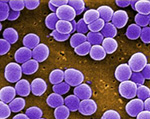While there are many alternatives to antibiotics for MRSA treatment, few are as safe, effective and easy to use as herbal blends. But you won’t find blends like this in the spice bottles on the shelves of your grocery store. These are medicinal grade botanical extracts grown and blended under stringent quality standards for specific support with infections.
Are Herbal Remedies Safe?

Herbal remedies for MRSA and Staph have a long history of use, many dating back thousands of years.
Most of the common herbs used for MRSA treatment support have a long history of safe use in humans. These so-called “alternative” and MRSA natural remedies are actually some of the oldest remedies on earth, some of which have been used for thousands of years. By comparison, antibiotic drugs have only been around for several decades and are arguably untried and unproven from a long-term perspective.
For example, garlic has been used for infections for at least 5,000 years and has been the subject of over 2,000 studies. Olive Leaf was used in ancient Egypt for preservation and in the 1800’s it was used with success against malaria. Tea tree oil, oregano oil and other botanical products have been used against infections for thousands of years and continue to be prescribed by medical doctors in France to this day.
One of the best things about herbal remedies is fewer side effects. While herbal remedies can be powerful and fast acting, they are also well balanced and evolutionarily “keyed” to the human body. In contrast, antibiotics have a long list of often serious side effects that can be more challenging to deal with than the infection itself.
Continue reading →







